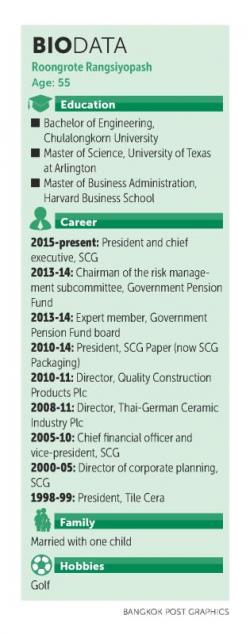
Roongrote Rangsiyopash is in his fourth year as the boss of Siam Cement Group (SCG) after succeeding former president and chief executive Kan Trakulhoon.
Mr Roongrote joined SCG in 1987, later holding many management positions within the group's operations domestically and abroad.
Now 55, he has spent a lot of time overseas in recent years, mainly in Southeast Asia, securing SCG's international foothold in global markets.
Under his philosophy, a business leader takes responsibility for both successes and failures and must be accountable and adaptable.
"He or she always faces many challenges under management, so a leader should cope well with obstacles and problems," Mr Roongrote says.
His mindset is that a good leader should drive the organisation to achieve, deliver the best outcome and commit with a solid footprint.
"Leadership is to take responsibility, not exercise his or her power," he says.
Like other large companies, SCG faces many changes in the world of business and the economic landscape: growing complexity, evolving consumer behaviour, the spectre of new rivals and bold strokes by existing ones.
"Flashing back four or five years ago, we did not expect that China's investors and companies would grow and expand their business presence worldwide," Mr Roongrote says. "They have come with new business platforms, not conventional methods; for example, providing e-marketplaces and retail channels without their manufacturing, but it has become such a competitive business."

For SCG, one of Thailand's oldest companies, it means formulating strategies to deal with change and handle new customer demands.
Established in 1913 after a royal decree by King Vajiravudh to make cement locally, SCG became the go-to firm for infrastructure projects as a substitute for imported building materials. Today SCG is Thailand's largest cement maker and industrial conglomerate.
Mr Roongrote says SCG's business strategies are adjusted and revised all the time. The most important thing is finding the right people for the right job, he says.
In the second century of SCG, the company's management team has cause for concern in the 2020s, particularly with regard to digital disruption, new competition and a saturated local market.
Mr Roongrote says he is committed to SCG becoming the strongest company in Southeast Asia, with a new vision and management tools under the theme "Passion for Better".
"We will emphasise innovation and sustainability," he says. "SCG started to implement a plan for an innovative workplace in 2015 as an example of corporate governance and sustainable development in the region."
To accomplish the company's goals, two key strategies are to expand the business presence at the regional level (mainly in Southeast Asia) and enhance competitiveness through higher-value-added products.
SCG hopes to contribute to sustainable progress wherever it operates and create value for customers, employees and stakeholders.
"We do believe in our business strategy to cope with this era," Mr Roongrote says.
For 2019, SCG has increased its investment budget by 23% to 60 billion baht to expand projects domestically and abroad. The group plans to invest 42 billion baht in Southeast Asia, accounting for 70% of the group's total investment budget for the year.
Mr Roongrote said SCG places strong emphasis on the region because it's a huge market with a large population and strong and growing economies. Southeast Asia's GDP growth averages 5.0-5.5% annually.
The remaining 30% of the investment funds will be allocated to projects in Thailand.
"SCG is expanding investment in logistics and service businesses to serve the Eastern Economic Corridor (EEC) scheme," Mr Roongrote says.
A large portion of the overseas investment budget, some 30 billion baht, will go to the Long Son Refinery Petrochemical Complex (LSP) in Vietnam. The investment is part of SCG's injection of US$5.4 billion into Vietnam's petrochemical complex.
The group expects revenue from overseas markets to increase to 60% of the total soon, up from 45-55%, driven by the Vietnamese facility that is scheduled to be completed in 2023.
For high-value-added products and services, SCG is focused on technology, innovation, product development and R&D to create solutions that meet quality standards and are competitive in the global market.
"Innovation can help SCG cope with competitiveness and global changes and help the company grow and survive amid the fast-changing business landscape," Mr Roongrote says.
SCG has put strategies in place to prevent and reduce risk, he says.
"The business leader must have his or her sweeping visions, to understand global changes and what impact they will have on the business and how to manage and handle any situation," he says.
In 2019, SCG expects revenue growth of 5% from 478 billion baht last year, thanks to an improving global economy, state infrastructure investment and the expansion of overseas operations.
In terms of his personal lifestyle, Mr Roongrote says he loves golf because "it helps me to be more concentrated on exercise and movement".
"When climbing to top management, it was not easy for me to allocate my time because I normally spend much time working," he says. "But I have tried to find balance between work and my personal life with my family."